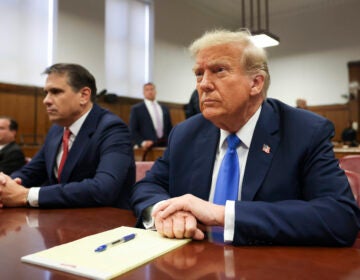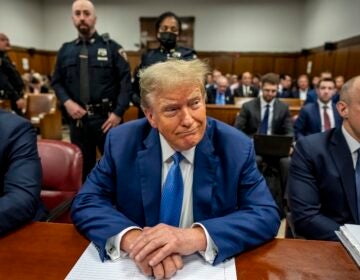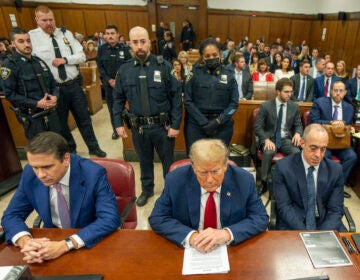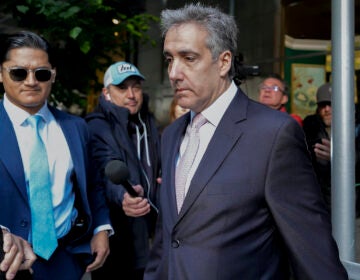Hulk Hogan, hurricanes and a blockbuster recording: A week in review of the Trump hush money trial
The second week of testimony in Donald Trump's momentous hush money trial saw crucial witnesses taking the stand.
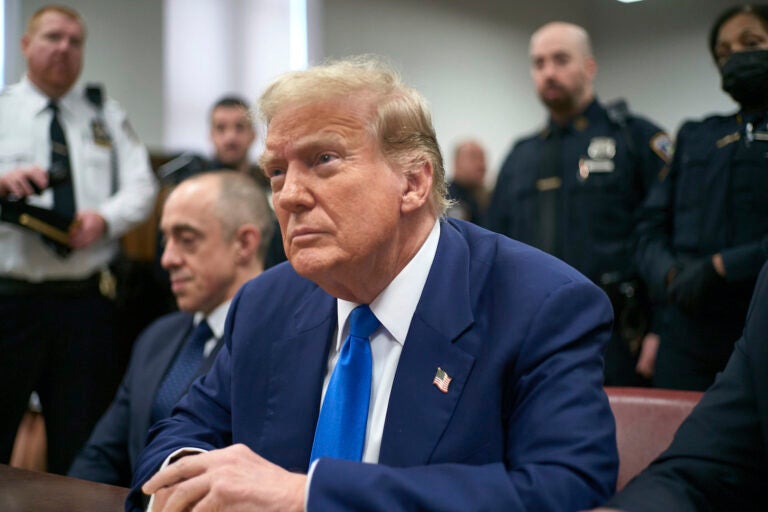
Former President Donald Trump appears at Manhattan criminal court before his trial in New York, Friday, May 3, 2024. (Curtis Means/Pool Photo via AP)
Crucial witnesses took the stand in the second week of testimony in Donald Trump’s hush money trial, including a California lawyer who negotiated deals at the center of the case and a longtime adviser to the former president.
Jurors heard a potentially pivotal piece of evidence — a 2016 recording of Trump discussing a plan to buy a Playboy model’s silence — as well as testimony about the wrestler Hulk Hogan and hurricanes, literal and figurative.
Outside the jury’s presence, Trump was fined for running afoul of a judge’s gag order. Additional sanctions could await the presumptive Republican nominee for president.
A look at some of the highlights from the past week:
A political hurricane … and an actual one
Hope Hicks, a onetime Trump confidant who for years was central in his orbit, described in detail a seminal moment of the 2016 campaign: The Washington Post’s disclosure of a 2005 “Access Hollywood” recording in which Trump boasted about grabbing women’s genitals without their permission.
Hicks acknowledged being “concerned, very concerned” when a reporter reached out to her for comment before breaking the story.
“I had a good sense to believe this was going to be a massive story and that it was going to dominate the news cycle for the next several days,” Hicks testified. “This was a damaging development.”
The recording, made public just days before a debate with Democratic nominee Hillary Clinton, is relevant to the case because prosecutors believe it helps explain the frenetic efforts by Trump and allies in the campaign’s remaining weeks to try to suppress any additional harmful stories that might arise.
In fact, in the aftermath of the tape’s release, Hicks said she asked Michael Cohen, Trump’s then-lawyer and personal fixer, to hunt down a rumor of another potentially damaging recording. “There was no such tape regardless,” Hicks said, “but he sort of chased that down for me.”
Regardless, the immediate impact of the “Access Hollywood” story was so intense, Hicks recalled, that it took attention away from an actual storm. Hurricane Matthew was dominating the news cycle when Hicks was contacted about the forthcoming story. That didn’t last long.
“The ‘Access Hollywood’ tape pushed the hurricane off the news?” prosecutor Matthew Colangelo asked.
“Yes,” Hicks replied.
Trump the extortion target?
Trump may be a criminal defendant, but an element of his defense came into view this past week when one of his lawyers suggested Trump might actually have been a victim.
Attorney Emil Bove implied during a notably tense cross-examination that his client had been effectively targeted for extortion by Keith Davidson, a crucial witness and the lawyer who negotiated hush money deals for two women, porn actor Stormy Daniels and Playboy model Karen McDougal, claiming to have had sexual encounters with Trump. Trump denies it.
Bove name-dropped a gaggle of celebrities he suggested had been coerced over the years into paying Davidson’s clients eye-popping sums to suppress harmful videos or stories. Among them was actor Charlie Sheen, whom Bove said Davidson had “extracted sums of money from;” Davidson took issue with the word “extract” but said he had been involved in “valid settlements” with Sheen.
Davidson also acknowledge that he had faced an FBI investigation, but was never charged, for allegedly attempting to extort Hogan to head off the release of the professional wrestling star’s sex tape.
By 2016, Bove suggested, Davidson was well-versed in the concept of squeezing celebrities such as Trump.
“And you did everything that you could to get as close to that line as possible in these negotiations without crossing it, right?” Bove asked.
“I did everything I could to make sure my activities were lawful,” Davidson replied.
‘What do we got to pay for this?’
The prosecution’s key witness, Cohen, has yet to testify — and Trump might never at all — but their voices were played in the courtroom in perhaps the most vivid piece of evidence so far.
Prosecutors played aloud a September 2016 recording that Cohen made of himself briefing the then-presidential candidate on a plan to buy McDougal’s silence with a $150,000 payment. McDougal was prepared to come forward with her account of an extramarital affair with Trump, a disclosure Trump and his allies were determined to prevent in the final days of the election.
“What do we got to pay for this? One-fifty?” Trump can be heard saying at one point.
They discuss whether the payment should be done with cash or check. Then the recording cuts out.
Though the existence of the recording surfaced in the summer of 2018 and has long been known to the public, its disclosure to the jury was a dramatic moment meant to establish that the hush money payment was done with Trump’s knowledge.
He appeared visibly irritated as the recording was played. Jurors seemed riveted.
The ‘jerk’
The recording was hardly the only time Cohen surfaced in court over the past week. When he did, it was generally in a negative light.
Davidson said his introduction to Cohen came in 2011 when Davidson was told that he needed to return an angry call from Cohen over a blog post related to Daniels and Trump. Davidson said Cohen was described to him by Daniels’ talent manager as “some jerk” who have been “very, very aggressive and threatened to sue me.”
When Davidson called Cohen and introduced himself, “I was just met with, like, a hustle barrage of insults and insinuations and allegations. That went on for quite a while.”
Davidson also recounted a memorable phone conversation with Cohen one month after the 2016 election in which the Trump attorney sounded “depressed and despondent” and complained about being passed over for a role in the new Trump administration.
“He said something to the effect of: ‘Jesus Christ. Can you (expletive) believe I’m not going to Washington,’” Davidson described Cohen as saying. “’After everything I’ve done for that (expletive) guy. I can’t believe I’m not going to Washington. I’ve saved that guy’s (expletive) so many times, you don’t even know.’”
The uncharitable characterizations may help Trump’s team in its efforts to undermine Cohen’s credibility. But they could also help prosecutors distance themselves from Cohen, subtly indicating to jurors that he is not a teammate but rather someone who simply has information.
To jail a president
A side issue throughout the trial is what to do about Trump’s outside-of-court comments. He repeatedly has maligned witnesses and suggested bias on the jury — all despite a judge’s gag order meant to bar him from verbal tirades against key players in the case.
Trump was assessed a $9,000 fine — $1,000 for each of nine separate gag order violations that the judge identified. Prosecutors later requested an additional $4,000 penalty for what they said were additional breaches of the order.
Yet it remains unclear what, if anything, Judge Juan M. Merchan can do in the event of continued violations. Merchan floated the possibility of jail, an unprecedented outcome for a former American president. That also would risk inflaming Trump’s base as he pursues the presidency and would further upend the 2024 White House race.
Trump’s attorneys insist he needs some leeway to be able to respond to relentless criticism, including from witnesses, and that his candidacy means he’s the subject of nonstop news media coverage.
Merchan seemed unpersuaded, but jail, for now at least, seems to be no one’s desired outcome.
“Because each of these statements was made before the Court held the Defendant in contempt for violating this order nine previous times, and because we prefer to minimize disruptions to this proceeding, we are not yet seeking jail,” prosecutor Chris Conroy said.
“But,” he added, “the Court’s decision this past Tuesday will inform the approach we take to any future violations.”
WHYY is your source for fact-based, in-depth journalism and information. As a nonprofit organization, we rely on financial support from readers like you. Please give today.


